The following is a list of recipients of the various awards, prizes, and honors presented during the 121st annual meeting of the American Historical Association on Friday, January 5, 2007, in the Hilton Atlanta, Grand Ballroom.
2006 Awards for Scholarly Distinction
In 1984 the Council of the American Historical Association established the American Historical Association Award for Scholarly Distinction. Each year a nominating jury, composed of the president, president-elect, and immediate past president, recommends to the Council of the Association up to three names for the award. Nominees are senior historians of the highest distinction in the historical profession who have spent the bulk of their professional careers in the United States. Previous awards have gone to Nettie Lee Benson, Woodrow Borah, Alfred D. Chandler Jr., Thomas D. Clark, Angie Debo, Helen G. Edmonds, Elizabeth Eisenstein, Peter Gay, Felix Gilbert, John Whitney Hall, Tulio Halperín-Donghi, John Higham, H. Stuart Hughes, Margaret Atwood Judson, Nikkie R. Keddie, George F. Kennan, Paul Oskar Kristeller, Gerhart B. Ladner, Gerda Lerner, Lawrence W. Levine, Wallace T. MacCaffrey, Ramsay MacMullen, Ernest R. May, Arno J. Mayer, Richard P. McCormick, August Meier, Edmund Morgan, George L. Mosse, Robert O. Paxton, John G. A. Pocock, Earl Pomeroy, H. Leon Prather Sr., Benjamin Quarles, Edwin O. Reischauer, Robert V. Remini, Nicholas V. Riasanovsky, Caroline Robbins, Arthur M. Schlesinger Jr., Carl E. Schorske, Benjamin I. Schwartz, Kenneth M. Setton, Nancy G. Siraisi, Kenneth M. Stampp, Chester G. Starr, Barbara and Stanley Stein, Lawrence Stone, Sylvia L. Thrupp Strayer, Merze Tate, Emma Lou Thornbrough, Brian Tierney, David Underdown, Eugen Weber, Gerhard Weinberg, and George R. Woolfolk.
Joining this distinguished list is David Brion Davis (Yale Univ.), Lloyd Gardner (Rutgers Univ.-New Brunswick), and Fritz Stern (Columbia Univ.).
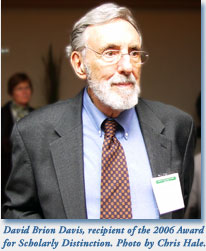 Over the past half century, no scholar has played a larger role in expanding contemporary understanding of how slavery shaped the history of the United States, the Americas, and the world than David Brion Davis, Sterling Professor of History Emeritus at Yale University.
Over the past half century, no scholar has played a larger role in expanding contemporary understanding of how slavery shaped the history of the United States, the Americas, and the world than David Brion Davis, Sterling Professor of History Emeritus at Yale University.
Addressing the profound transformation of human practices involved in dismantling the institution of slavery, he has forced historians to confront the centrality of slavery in modern history—its role in political and social thought, its contribution to the conquest and settlement of the Americas, and its place in the upheavals of the age of revolution. David Brion Davis writes comparative history that cuts across boundaries of time and space, and cultural history that explores the intersection of ideas and social contexts. Transcending the boundaries of the nation-state, his work has demonstrated the interconnectedness of historical experiences too often viewed in isolation.
Moral imagination has animated all of David Brion Davis’s historical inquiries, which have been attuned to the ideological shifts that, in his words, might “enable human society to be something more than an endless contest of greed and power.”
Over the course of 50 years, Davis has written or edited 18 books, among them Slavery and Human Progress (Oxford Univ. Press, 1984),The Problem of Slavery in Western Culture (Oxford Univ. Press, 1966), The Problem of Slavery in the Age of Revolution (Oxford Univ. Press, 1975), and, most recently, Inhuman Bondage, The Rise and Fall of Slavery in the New World (Oxford Univ. Press, 2006). He has won the Pulitzer (1967), Bancroft (1976), and Beveridge (1975) prizes, a National Book Award (1975), and the Society of American Historians’ Bruce Catton Prize for Lifetime Achievement (2004). He is past president of the Organization of American Historians (1988–89).
Davis has long been deeply committed to the professional development of middle school and high school students and teachers and faculty members at small colleges. As founding director of Yale’s Gilder Lehrman Center for the Study of Slavery, Resistance, and Abolition, Davis has worked to institutionalize the study of slavery, organizing annual international conferences, funding fellowships, seminars, and workshops for students and teachers, and awarding a major book prize to promote the study of slavery in all time periods and countries.
David Brion Davis’s many students have testified to the inspiring example he has set of a historian for whom history without a moral dimension is antiquarianism. In his hands, history is an instrument of moral and psychological self-discovery and a way to free ourselves from deceptions embedded in our culture. In his scholarly integrity and humanistic sensibility, Davis embodies our profession’s highest ideals and aspirations.
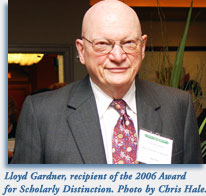 For the past 40 years, Lloyd Gardner has been among the most critical, insightful, and prolific analysts of 20th-century American foreign policy. Trained at Wisconsin under Fred Harvey Harrington, and part of a cohort of scholars who set out to revise traditional Cold War interpretations of American foreign policy, Gardner is nonetheless difficult to place in any particular “school” of interpretation or identify in terms of a particular era of foreign policy. Rather, he has produced more than a dozen books, touching on virtually every major aspect of American foreign policy in the last century, and contributed his own imaginative interpretation of each subject he has engaged. At the center of Gardner’s work has been a willingness to take seriously what American policy makers said and did, rather than reduce them simply to spokespeople for economic interests or moralistic crusades. If he found Woodrow Wilson, Henry Stimson, Dean Acheson, and Lyndon Johnson “architects of illusion,” it was because he credited their power to create grand illusions, and teased out the tragedy when those illusions led their creators (and the American people) astray. His analysis in Safe for Democracy: The Anglo-American Response to Revolution, 1913–1923 (Oxford Univ. Press, 1984) of how Woodrow Wilson’s intervention in Mexican politics prefigured his commitment of America to a European war and in Pay Any Price: Lyndon Johnson and the Wars for Vietnam (Ivan R. Dee, Publisher, 1995) of how Lyndon Johnson’s decisions on the Vietnam War grew from his New Deal liberalism are among the most significant interpretations of American foreign policy produced in the last half century.
For the past 40 years, Lloyd Gardner has been among the most critical, insightful, and prolific analysts of 20th-century American foreign policy. Trained at Wisconsin under Fred Harvey Harrington, and part of a cohort of scholars who set out to revise traditional Cold War interpretations of American foreign policy, Gardner is nonetheless difficult to place in any particular “school” of interpretation or identify in terms of a particular era of foreign policy. Rather, he has produced more than a dozen books, touching on virtually every major aspect of American foreign policy in the last century, and contributed his own imaginative interpretation of each subject he has engaged. At the center of Gardner’s work has been a willingness to take seriously what American policy makers said and did, rather than reduce them simply to spokespeople for economic interests or moralistic crusades. If he found Woodrow Wilson, Henry Stimson, Dean Acheson, and Lyndon Johnson “architects of illusion,” it was because he credited their power to create grand illusions, and teased out the tragedy when those illusions led their creators (and the American people) astray. His analysis in Safe for Democracy: The Anglo-American Response to Revolution, 1913–1923 (Oxford Univ. Press, 1984) of how Woodrow Wilson’s intervention in Mexican politics prefigured his commitment of America to a European war and in Pay Any Price: Lyndon Johnson and the Wars for Vietnam (Ivan R. Dee, Publisher, 1995) of how Lyndon Johnson’s decisions on the Vietnam War grew from his New Deal liberalism are among the most significant interpretations of American foreign policy produced in the last half century.
In his years at Rutgers University, Gardner trained over three dozen graduate students and won the school’s Warren Susman Award for distinguished undergraduate teaching. As an emeritus professor he continues to offer new courses, most recently a seminar on presidential lying and a lecture course on American Middle Eastern policies. His most recent book, a major reassessment of the Lindbergh kidnapping, is characteristic of the innovative way over his entire career that Lloyd Gardner has asked new questions and assessed issues of true significance in American public life.
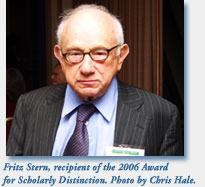 In August 2006, Fritz Stern‘s magisterial autobiography, Five Germanys I Have Known (Farrar, Straus and Giroux, 2006), was published to wide acclaim. Amos Elon wrote in the New York Review of Books, “His impressive book combines haunted childhood memories with learned insights and reflections on German and American history. Its main concern is expressed in its emphasis on the fragility of democracy everywhere.” Elon captured Stern’s lifelong preoccupation: the study of history, biography, and autobiography can inform and can warn of humanity’s “dreams and delusions,” a phrase Stern used as a title for one collection of essays.
In August 2006, Fritz Stern‘s magisterial autobiography, Five Germanys I Have Known (Farrar, Straus and Giroux, 2006), was published to wide acclaim. Amos Elon wrote in the New York Review of Books, “His impressive book combines haunted childhood memories with learned insights and reflections on German and American history. Its main concern is expressed in its emphasis on the fragility of democracy everywhere.” Elon captured Stern’s lifelong preoccupation: the study of history, biography, and autobiography can inform and can warn of humanity’s “dreams and delusions,” a phrase Stern used as a title for one collection of essays.
Stern emigrated from Germany in 1938 and was raised in New York. He attended Columbia College and University, receiving his PhD under Jacques Barzun in 1953. His publications, beginning with his 1961 classic The Politics of Cultural Despair: A Study in the Rise of the Germanic Ideology (Univ. of California Press, 1961), quickly established his reputation as a thoughtful, reflective scholar and a consummate stylist of historical prose. His master work, Gold and Iron: Bismarck, Bleichröder, and the Building of the German Empire (Knopf, 1977) has been widely cited on both sides of the Atlantic as one of the most significant examinations of German and European politics and economics. Stern’s forte has been his splendid portraits of important historical figures—such as the scientists Albert Einstein and Fritz Haber.
In addition to his scholarship, Stern’s reputation as a master professor earned him a Great Teacher Award by graduates and an Award of Excellence by Columbia’s Alumni Association of Graduate Faculties. He has received numerous prestigious accolades, including the Order Pour le Mérite from the Federal Republic of Germany (1994), a DLH from Oxford University (1985), the 1999 Peace Prize of the German Book Trade, and the 2004 Leo Baeck Medal. He has served on the American Historical Review’s board of editors. The German Historical Institute presents a dissertation award in his name annually.
Stern’s influence extends far beyond the historical profession. His legacy can be found in his writing for scholars, for policymakers, and for the general public. As the former U.S. Ambassador to Germany and U.S. Representative to the United Nations, Richard C. Holbrooke wrote, “Fritz Stern is … a living national treasure in both the United States and Germany.” It is with great pleasure that the American Historical Association makes this award in appreciation to Fritz Stern.
The Troyer Steele Anderson Prize
Established in 1963 through a bequest by Frank Maloy Anderson, a longtime AHA member, this prize is awarded for outstanding contributions to the advancement of the purposes of the Association and has been conferred just five times. The AHA Council selects a recipient based upon the recommendations of the Professional Division, which serves as a nominating jury in consultation with the Research and Teaching Divisions.
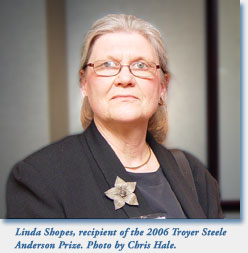 The latest recipient of the Anderson Prize is Linda Shopes (Pennsylvania Historical & Museum Commission), for her tireless efforts on behalf of public history within the American Historical Association and the profession. As a member of the Committee on Women Historians (1995–98), as an elected member of the Council (1999–2002), and as chair of the Task Force on Public History (2001–05), she brought unfailing energy, vision, and political skill to several key issues confronting the AHA and the profession.
The latest recipient of the Anderson Prize is Linda Shopes (Pennsylvania Historical & Museum Commission), for her tireless efforts on behalf of public history within the American Historical Association and the profession. As a member of the Committee on Women Historians (1995–98), as an elected member of the Council (1999–2002), and as chair of the Task Force on Public History (2001–05), she brought unfailing energy, vision, and political skill to several key issues confronting the AHA and the profession.
During her term on the Council, Shopes took on the formidable task of addressing the complex and often contentious relationships between oral history and Institutional Review Boards. She made countless trips to Washington, D.C., to meet with various government committees and kept the historical community informed on a complicated and endlessly shifting debate. As a former president of the Oral History Association, she brought much expertise to the subject and a certain tenaciousness that was uniquely appropriate to the bewildering and overlapping array of jurisdictions and politics involved.
Her determined leadership, advice, and encouragement reshaped the way the Association relates to public history. The January 2004 Task Force on Public History report challenged the AHA to fully incorporate public history and public historians into all of its activities, to promote greater professional exchange between public and academic historians, and to encourage all historians, whatever their work context, to participate in public life. The ambitious agenda outlined in the report will affect the Association and the profession for years to come.
The Eugene Asher Distinguished Teaching Award
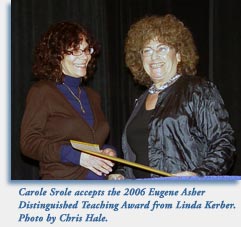 Established in 1986, the Eugene Asher Distinguished Teaching Award recognizes outstanding teaching and advocacy for history teaching at two-year, four-year, and graduate colleges and universities, by commending an inspiring teacher whose pedagogical techniques and mastery of subject matter make a lasting impression and substantial difference to students of history. The prize is named for the late Eugene Asher who was for many years a leading advocate for history teaching. The Society for History Education (SHE) shares with the AHA sponsorship of the award. Members of the AHA and SHE submit nominations to the Committee on Teaching Prizes.
Established in 1986, the Eugene Asher Distinguished Teaching Award recognizes outstanding teaching and advocacy for history teaching at two-year, four-year, and graduate colleges and universities, by commending an inspiring teacher whose pedagogical techniques and mastery of subject matter make a lasting impression and substantial difference to students of history. The prize is named for the late Eugene Asher who was for many years a leading advocate for history teaching. The Society for History Education (SHE) shares with the AHA sponsorship of the award. Members of the AHA and SHE submit nominations to the Committee on Teaching Prizes.
The honoree for 2006 is Carole Srole (California State Univ. at Los Angeles). A distinguished historian of gender and labor history, Srole is also an accomplished, thoughtful, and innovative teacher, with dozens of pedagogical presentations and publications to her credit. Her commitment to building students’ writing and analytical skills is clear in her challenging and original assignments and on every page of her syllabi. Her students and colleagues have already recognized Carole Srole’s excellence in teaching, and the Teaching Prize Committee is pleased to honor her as well.
Beveridge Family Teaching Award
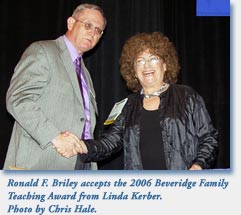 Established in 1995, this prize honors the Beveridge family’s long-standing commitment to the AHA and to K-12 teaching. Friends and family members endowed this award to recognize excellence and innovation in elementary, middle, and secondary school history teaching, including career contributions and specific initiatives. The award is either for excellence in teaching or for an innovative initiative applicable to the entire field. It is offered on a two-year rotation: in even-numbered years, to an individual; in odd-numbered years, to a group. The prize was first offered in 1996, and in 2006 it is awarded to an individual teacher.
Established in 1995, this prize honors the Beveridge family’s long-standing commitment to the AHA and to K-12 teaching. Friends and family members endowed this award to recognize excellence and innovation in elementary, middle, and secondary school history teaching, including career contributions and specific initiatives. The award is either for excellence in teaching or for an innovative initiative applicable to the entire field. It is offered on a two-year rotation: in even-numbered years, to an individual; in odd-numbered years, to a group. The prize was first offered in 1996, and in 2006 it is awarded to an individual teacher.
The 11th recipient of the Beveridge Family Teaching Prize is Ronald F. Briley (Sandia Preparatory School, Albuquerque, N.M.). Throughout his extensive teaching career, Briley has contributed to the scholarship of sport, political, and Native American history. He is, however, most widely recognized for his innovative teaching about and with films, and for his numerous publications and presentations on the benefits of teaching students to analyze movies critically. An inspiration to his students and colleagues, Ron Briley is a worthy recipient of this award.
Herbert Feis Award for Distinguished Contributions to Public History
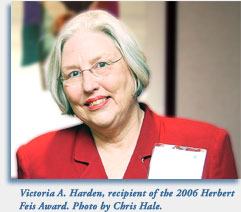 Established in 1984, this prize is offered annually to recognize distinguished contributions to public history during the previous 10 years. The prize is named in memory of Herbert Feis (1893–1972), public servant and historian of recent American foreign policy, with an initial endowment from the Rockefeller Foundation.
Established in 1984, this prize is offered annually to recognize distinguished contributions to public history during the previous 10 years. The prize is named in memory of Herbert Feis (1893–1972), public servant and historian of recent American foreign policy, with an initial endowment from the Rockefeller Foundation.
The prize was originally given for books produced by historians working outside of academe. From 2006, the scope of the award has been widened to include other types of public history work. The terms of the award now define both “contribution” and “public history” broadly. Contributions could, for example, include work as the administrator of a public history group or agency (such as a historical society, a historic site, or a community history project) or as the creator or producer of a public history product or products (such as a museum exhibit, radio script, web site, oral history collection, or film). Often, the contribution will be the result of years of effort in the field, but the prize can also recognize a singular contribution of major importance such as a pathbreaking museum exhibit. Public history is defined as work primarily directed at nonacademic, nonschool-based audiences. Those audiences could be very broad (such as television viewers) or highly specialized (policymakers, for example). Although the audience is primarily outside of academia, the recipient of the award can be employed at a university.
The recipient of the Herbert Feis Award for 2006 is Victoria A. Harden (American Univ. and National Institutes of Health, retired). Harden’s sustained contributions to the field of public history are exemplary. She established the Office of NIH History and the DeWitt Stetten Jr. Museum of Medical Research at the National Institutes of Health; developed public programs and exhibits to cultivate public and scholarly interest in the history of medical research at the NIH; and chaired a national committee on museum exhibit standards. She is a distinguished scholar who has been a consistent advocate for public history within the scholarly community.
Nancy Lyman Roelker Mentorship Award
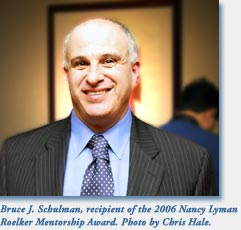 In recognition of Nancy Lyman Roelker’s role as a teacher, scholar, and committee member of the historical profession, and on the occasion of her 75th birthday, friends, colleagues, and former students established the Nancy Lyman Roelker Mentorship Award. The annual award recognizes and encourages a special quality exemplified by Roelker through the human component in her teaching of history.
In recognition of Nancy Lyman Roelker’s role as a teacher, scholar, and committee member of the historical profession, and on the occasion of her 75th birthday, friends, colleagues, and former students established the Nancy Lyman Roelker Mentorship Award. The annual award recognizes and encourages a special quality exemplified by Roelker through the human component in her teaching of history.
Mentoring should encompass not only a belief in the value of the study of history but also a commitment to and a love of teaching it to students regardless of age or career goals. Advising is an essential component, but it also combines a consistent personal commitment by the mentor to the student as a person. Offering a human alternative, frequently in quiet and unacknowledged ways, mentors like Roelker believe that the essence of history lies in its human scope. With this award, the American Historical Association attests to the special role of mentors to the future of the historical profession.
The award is given annually in rotation to graduate, undergraduate, and secondary school teacher mentors. Nominations for the 2006 award were for graduate mentors. Bruce J. Schulman (Boston Univ.), is the recipient of the 15th annual Roelker Mentorship Award.
Schulman’s students are effusive about the impact he has had on their lives. Every student he has ever advised is tenured or holds a tenure-track position. Widely praised by his students and peers as a genuinely kind, generous, professional, and decent man with a great sense of humor, Bruce J. Schulman is a gifted lecturer, an outstanding mentor, a model teacher, and has been extraordinarily generous with his time in inspiring generations of students.
Honorary Foreign Member
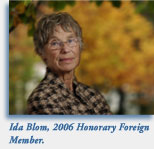 At its second annual meeting in Saratoga in 1885, the newly appointed Committee on Nominations for Honorary Membership appointed Leopold von Ranke as the first honorary foreign member of the AHA. Previously selected biennially, selection is now made annually, to honor a foreign scholar who is distinguished in his or her field and who has “notably aided the work of American historians.
At its second annual meeting in Saratoga in 1885, the newly appointed Committee on Nominations for Honorary Membership appointed Leopold von Ranke as the first honorary foreign member of the AHA. Previously selected biennially, selection is now made annually, to honor a foreign scholar who is distinguished in his or her field and who has “notably aided the work of American historians.
The honorary foreign membership for 2006 was conferred upon Ida Blom, professor emerita at the University of Bergen in Norway. President-elect Barbara Weinstein read the following citation: “Dr. Blom is one of the leading scholars of the history of women and gender in Europe, with a worldwide reputation as one of the field’s most active exponents of the uses of gender to interpret social and political change in a global context. She is the author of five pathbreaking books, and dozens of articles, and is co-author or editor of five more volumes. Her work has ranged from studies of feminism and social policy to more recent attention and pioneering work on comparative questions of global women’s history.
“As a colleague to American scholars, Professor Blom actively incorporated historians from the United States into global networks of research and scholarship on the history of women. As a founding member and the first president of the International Federation for Research on Women’s History, Dr. Blom drew American historians into international networks and encouraged Americanists to think from a global perspective. Her work has ranged from an early interest in international relations to studies of feminism and social policy and, more recently, comparative questions of global women’s history.
“This honor is a fitting tribute to a scholar who has done so much to shape American ideas about women and gender and to incorporate American scholars into an energetic debate about the historical meanings of gender that flows across our borders.”
Book Awards
The following prizes were announced for the year 2006. The prize citations are recorded below.
Herbert Baxter Adams Prize
Stefanie B. Siegmund (Univ. of Michigan), for The Medici State and the Ghetto of Florence: The Construction of an Early Modern Jewish Community (Stanford Univ. Press, 2006). Stefanie Siegmund’s book establishes her as a major contributor to European Jewish history and as a sophisticated, perceptive scholar of early modern social and political development. Based on meticulous archival research, the book provides a lucid account of the effects of ghettoization on all aspects of Tuscan Jewish life and on the lineaments of the modern state. As an exemplar of rigorous analytical history, it addresses, in the best tradition of Adams Prize winners, issues that transcend the specifics of both period and place.
George Louis Beer Prize
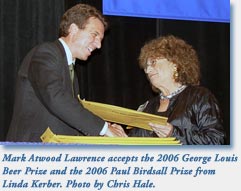 Mark Atwood Lawrence (Univ. of Texas at Austin), for Assuming the Burden: Europe and the American Commitment to War in Vietnam (Univ. of California Press, 2005). This pathbreaking study draws on a wide range of documents in American, British, and French archives to explain how the war that erupted in French Indochina in 1946 was transformed from a colonial conflict into an Asian front of the Cold War by early 1950. With an engaging narrative marked by a lucid, evocative style, Lawrence persuasively demonstrates how Western governments reached consensus on the necessity of defeating the insurgent forces of Ho Chi Minh.
Mark Atwood Lawrence (Univ. of Texas at Austin), for Assuming the Burden: Europe and the American Commitment to War in Vietnam (Univ. of California Press, 2005). This pathbreaking study draws on a wide range of documents in American, British, and French archives to explain how the war that erupted in French Indochina in 1946 was transformed from a colonial conflict into an Asian front of the Cold War by early 1950. With an engaging narrative marked by a lucid, evocative style, Lawrence persuasively demonstrates how Western governments reached consensus on the necessity of defeating the insurgent forces of Ho Chi Minh.
Albert J. Beveridge Award
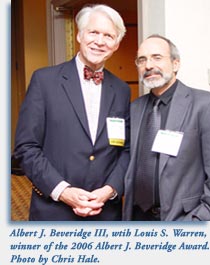 Louis S. Warren (Univ. of California at Davis), forBuffalo Bill’s America: William Cody and the Wild West Show (Knopf, 2005). Louis Warren’s book is culture studies at its best, presenting Buffalo Bill as both impostor and innovator. Drawing on an impressive array of sources, Warren connects Buffalo Bill’s life story to the stresses and strains of American society. Warren challenges the tendency to think of the West as an initial stage of expansion followed by a second stage of memory and myth. Instead, he shows that mythmaking went hand in hand with expansion.
Louis S. Warren (Univ. of California at Davis), forBuffalo Bill’s America: William Cody and the Wild West Show (Knopf, 2005). Louis Warren’s book is culture studies at its best, presenting Buffalo Bill as both impostor and innovator. Drawing on an impressive array of sources, Warren connects Buffalo Bill’s life story to the stresses and strains of American society. Warren challenges the tendency to think of the West as an initial stage of expansion followed by a second stage of memory and myth. Instead, he shows that mythmaking went hand in hand with expansion.
Paul Birdsall Prize
Mark Atwood Lawrence (Univ. of Texas at Austin), for Assuming the Burden: Europe and the American Commitment to War in Vietnam (Univ. of California Press, 2005). Lawrence’s thoroughly researched, carefully argued, and extensively documented work is an important investigation of the elite-dominated mechanisms that lie behind military and diplomatic decision making even in modern democracies. His scholarly analysis transcends national boundaries to shed new light on the process whereby American forces were knowingly committed to a conflict in Indochina with destructive consequences for both Vietnam and the United States, a story with significant current resonance.
James Henry Breasted Prize
Chris Wickham (All Souls College, Univ. of Oxford), for Framing the Early Middle Ages: Europe and the Mediterranean, 400–800 (Oxford Univ. Press, 2005). Framing the Early Middle Ages is an ambitious essay in historical interpretation. Wickham compares developments in 14 regions of the Roman, post-Roman, and Islamic worlds across half a millennium. Despite its scope, it develops a strong argument: that systems of production and exchange, and related structures of government, lie at the heart of any understanding of historical change in this period. The theoretical and empirical work that support this claim are exemplary. The history of late antiquity is thereby set on new footing.
Albert B. Corey Prize
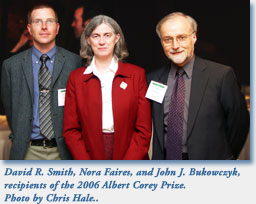 John J. Bukowczyk (Wayne State Univ.), Nora Faires (Western Michigan Univ.), David R. Smith (Univ. of Michigan at Ann Arbor), and Randy William Widdis (Univ. of Regina), for Permeable Border: The Great Lakes Basin as Transnational Region, 1650–1990 (Univ. of Pittsburgh Press and Univ. of Calgary Press, 2005). Among a strong field of entries, Permeable Border stood out as a particularly successful effort to push forward understandings of Canadian-American borderlands via emerging ideas of transnationalism. Taking a broad sweep of time, and balancing new research with critical historiographical analysis, the border is examined as a “human creation.. typically invisible, geographically illogical, militarily indefensible, and emotionally inescapable”—a border that paradoxically strengthens and disappears simultaneously amidst competing forces of nationalism and globalization.
John J. Bukowczyk (Wayne State Univ.), Nora Faires (Western Michigan Univ.), David R. Smith (Univ. of Michigan at Ann Arbor), and Randy William Widdis (Univ. of Regina), for Permeable Border: The Great Lakes Basin as Transnational Region, 1650–1990 (Univ. of Pittsburgh Press and Univ. of Calgary Press, 2005). Among a strong field of entries, Permeable Border stood out as a particularly successful effort to push forward understandings of Canadian-American borderlands via emerging ideas of transnationalism. Taking a broad sweep of time, and balancing new research with critical historiographical analysis, the border is examined as a “human creation.. typically invisible, geographically illogical, militarily indefensible, and emotionally inescapable”—a border that paradoxically strengthens and disappears simultaneously amidst competing forces of nationalism and globalization.
John Edwin Fagg Prize
David J. Weber (Southern Methodist Univ.), for Bárbaros: Spaniards and Their Savages in the Age of Enlightenment (Yale Univ. Press, 2005). Sweeping across Spanish America from the borderlands of northern New Spain to southern Patagonia, David Weber’s Bárbaros: Spaniards and Their Savages in the Age of Enlightenment presents a comprehensive picture of the Spanish rationale and effort to understand and incorporate groups of unconquered Native Americans. Beautifully crafted, based on years of research, Bárbaros is a stunning contribution to understanding Spanish Enlightenment policies in the New World during the last half of the 18th century.
John K. Fairbank Prize in East Asian History
Madeleine Zelin (Columbia Univ.), for The Merchants of Zigong: Industrial Entrepreneurship in Early Modern China (Columbia Univ. Press, 2006). Zelin’s exhaustively researched study of privately owned Zigong salt manufacturing firms in 19th- and early 20th-century China sets a new standard for business and economic history. Her detailed analyses of indigenous business practices, technology, capital accumulation, and organization revises and enriches existing explanations of China’s economic development and worldwide development models. Exercising masterful control over sources and argumentation, Zelin has produced an illuminating and remarkable work of historical scholarship.
Morris D. Forkosch Prize
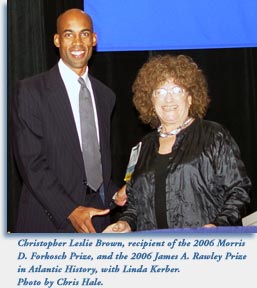 Christopher Leslie Brown (Rutgers Univ.-New Brunswick), for Moral Capital: Foundations of British Abolitionism (Univ. of North Carolina Press for the Omohundro Institute of Early American History and Culture, 2006). Moral Capital challenges the dominant historical interpretations of the antislavery movement. For Brown, the American Revolution was crucial to the rise of antislavery sentiment in Britain. Drawing a contrast between British anti-slavery and American abolitionist movements, Brown argues that the British campaign captured a moral high ground that American anti-slavery activists never attained. The book provides the reader with a great understanding of the tensions and passions that animated discussion in antislavery circles in the late 18th century.
Christopher Leslie Brown (Rutgers Univ.-New Brunswick), for Moral Capital: Foundations of British Abolitionism (Univ. of North Carolina Press for the Omohundro Institute of Early American History and Culture, 2006). Moral Capital challenges the dominant historical interpretations of the antislavery movement. For Brown, the American Revolution was crucial to the rise of antislavery sentiment in Britain. Drawing a contrast between British anti-slavery and American abolitionist movements, Brown argues that the British campaign captured a moral high ground that American anti-slavery activists never attained. The book provides the reader with a great understanding of the tensions and passions that animated discussion in antislavery circles in the late 18th century.
Leo Gershoy Award
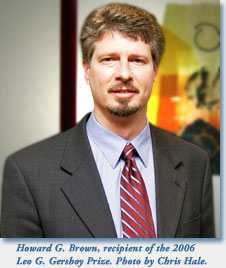 Howard G. Brown (SUNY at Binghamton), for Ending the French Revolution: Violence, Justice and Repression from the Terror to Napoleon (Univ. of Virginia Press, 2006). Drawing on exhaustive archival research, Howard Brown shows the extent to which a heavily militarized “security state” emerged in France well before Napoleon’s seizure of power. He also offers a powerful argument that this state, far from representing the repression of liberal politics, arose in symbiotic relation to those politics. The result is a book that fundamentally revises our understanding of how the French Revolution ended, and also speaks, in a disquieting way, to the present day.
Howard G. Brown (SUNY at Binghamton), for Ending the French Revolution: Violence, Justice and Repression from the Terror to Napoleon (Univ. of Virginia Press, 2006). Drawing on exhaustive archival research, Howard Brown shows the extent to which a heavily militarized “security state” emerged in France well before Napoleon’s seizure of power. He also offers a powerful argument that this state, far from representing the repression of liberal politics, arose in symbiotic relation to those politics. The result is a book that fundamentally revises our understanding of how the French Revolution ended, and also speaks, in a disquieting way, to the present day.
Clarence H. Haring Prize
Marial Iglesias Utset (Univ. of Havana), for Las Metáforas del Cambio en la Vida Cotidiana: Cuba, 1898–1902 (Ediciones UNION, 2003). The author engagingly examines the construction of Cuban political and political culture and the meaning of cubanidad in the period following the Spanish-Cuban-American War as U.S. political supervision replaced Spanish colonial administration leading to the establishment of the Cuban republic. She makes a convincing argument that despite the attempts of political elites to control the construction of notions of national attributes, patriotism, and historical memory, the debate was joined by thousands of Cubans, the majority of them illiterate, who significantly affected the outcome.
Joan Kelly Memorial Prize in Women’s History
Dorothy Ko (Barnard College, Columbia Univ.), forCinderella’s Sisters: A Revisionist History of Footbinding (Univ. of California Press, 2005). Using an extraordinary range of sources, from philological treatises of connoisseurship to elegantly embroidered shoes, Ko reconstructs the long and complex history of footbinding. Rejecting a simple, unchanging story of male perversion and female oppression, Ko situates footbinding in the shifting worlds of gendered desire, global commercial exchange, nostalgia, regional exoticism, women’s labor, and the subjective experience of the body. Her contributions to women’s and gender history, social history, and cultural studies are monumental.
Waldo G. Leland Prize
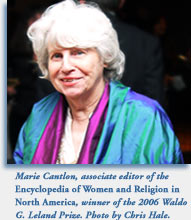 Encyclopedia of Women and Religion in North America (Indiana Univ. Press, 2006), Rosemary Skinner Keller (Union Theological Seminary in New York), editor; Rosemary Radford Ruether (Graduate Theological Union of the Pacific), editor; and Marie Cantlon (Proseworks), associate editor. This three-volume reference work addresses an important and much neglected subject. The impressive coverage is in the form of article-length entries (5 to 12 pages) researched and written by specialists. The entries on religious movements have been adroitly situated within the context of social, political, and economic events. These entries also include listings and discussions of selected scholarly published resources and archival materials. A detailed index further increases the value of this excellent reference work.
Encyclopedia of Women and Religion in North America (Indiana Univ. Press, 2006), Rosemary Skinner Keller (Union Theological Seminary in New York), editor; Rosemary Radford Ruether (Graduate Theological Union of the Pacific), editor; and Marie Cantlon (Proseworks), associate editor. This three-volume reference work addresses an important and much neglected subject. The impressive coverage is in the form of article-length entries (5 to 12 pages) researched and written by specialists. The entries on religious movements have been adroitly situated within the context of social, political, and economic events. These entries also include listings and discussions of selected scholarly published resources and archival materials. A detailed index further increases the value of this excellent reference work.
Littleton-Griswold Prize
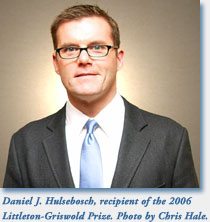 Daniel J. Hulsebosch (New York Univ. School of Law), for Constituting Empire: New York and the Transformation of Constitutionalism in the Atlantic World, 1664–1830 (Univ. of North Carolina Press, 2006). Focusing on colonial and early national New York, Daniel Hulsebosch integrates the history of legal thought with the social history of politics, revising our understanding of how the colonial era shaped what was truly new about American constitutionalism. This is an elegant, scholarly work, based on painstaking research in support of a novel thesis.
Daniel J. Hulsebosch (New York Univ. School of Law), for Constituting Empire: New York and the Transformation of Constitutionalism in the Atlantic World, 1664–1830 (Univ. of North Carolina Press, 2006). Focusing on colonial and early national New York, Daniel Hulsebosch integrates the history of legal thought with the social history of politics, revising our understanding of how the colonial era shaped what was truly new about American constitutionalism. This is an elegant, scholarly work, based on painstaking research in support of a novel thesis.
J. Russell Major Prize
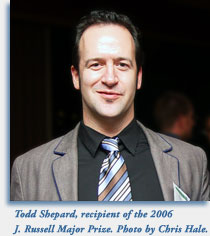 Todd Shepard (Temple Univ.), for The Invention of Decolonization: The Algerian War and the Remaking of France (Cornell Univ. Press, 2006). This provocative work argues that French politicians, journalists, and scholars deployed the concept of “decolonization” during the crisis of the early 1960s to efface the prior relationship between the French Republic and Algeria. According to Shepard, French policy turned away from early experiments in accommodating religious and ethnic differences, and French identity was defined so as to exclude groups previously included, thus favoring Europeans, non-Muslims, and a “universal” ideal that still dominates public debate.
Todd Shepard (Temple Univ.), for The Invention of Decolonization: The Algerian War and the Remaking of France (Cornell Univ. Press, 2006). This provocative work argues that French politicians, journalists, and scholars deployed the concept of “decolonization” during the crisis of the early 1960s to efface the prior relationship between the French Republic and Algeria. According to Shepard, French policy turned away from early experiments in accommodating religious and ethnic differences, and French identity was defined so as to exclude groups previously included, thus favoring Europeans, non-Muslims, and a “universal” ideal that still dominates public debate.
Helen and Howard R. Marraro Prize
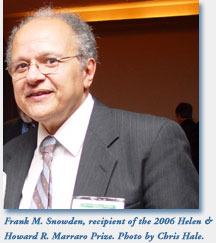 Frank M. Snowden (Yale Univ.), for The Conquest of Malaria: Italy, 1900–1962 (Yale Univ. Press, 2006). This thoroughly researched study shows that malaria, and the campaign to eradicate it, were central to Italian history for a century after unification. Interweaving probing analysis with compelling narrative, the author delineates the complex process through which the disease was finally eliminated. He demonstrates that longer-term Italian efforts to change sociocultural structures, even when not immediately fruitful, were crucial to eventual success—and suggest important lessons for the ongoing effort to eradicate malaria elsewhere.
Frank M. Snowden (Yale Univ.), for The Conquest of Malaria: Italy, 1900–1962 (Yale Univ. Press, 2006). This thoroughly researched study shows that malaria, and the campaign to eradicate it, were central to Italian history for a century after unification. Interweaving probing analysis with compelling narrative, the author delineates the complex process through which the disease was finally eliminated. He demonstrates that longer-term Italian efforts to change sociocultural structures, even when not immediately fruitful, were crucial to eventual success—and suggest important lessons for the ongoing effort to eradicate malaria elsewhere.
George L. Mosse Prize
Sandra Herbert (Univ. of Maryland Baltimore County), for Charles Darwin, Geologist (Cornell Univ. Press, 2005). Interweaving Darwin’s reading, his exchanges with contemporary geographers, letters, diaries, and published works, Herbert brilliantly analyzes his engagement with the emerging discipline of geology. Painstakingly reconstructing Darwin’s intellectual development within academic, religious, political, and institutional milieu, Herbert powerfully demonstrates the breadth of his scientific vision. Deeply researched and carefully crafted, Herbert’s book provides important new contexts for understanding The Origin of Species.
Premio del Rey
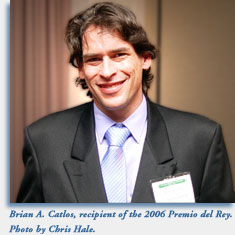 Brian A. Catlos (Univ. of California at Santa Cruz), for The Victors and the Vanquished: Christians and Muslims of Catalonia and Aragon, 1050–1300 (Cambridge Univ. Press, 2004). This book is a major contribution to our knowledge of the transformation of an Islamic society into a Mudéjar society. Based on exhaustive research in archival, archeological, and topographical sources, Brian Catlos examines the complex inner workings of religious, cultural, and political communities, and points out Muslim contributions to the economy of the Christian Ebro region. The author skillfully illustrates the Mudéjares facility of adapting two different cultural traditions in their use of various languages and dating systems.
Brian A. Catlos (Univ. of California at Santa Cruz), for The Victors and the Vanquished: Christians and Muslims of Catalonia and Aragon, 1050–1300 (Cambridge Univ. Press, 2004). This book is a major contribution to our knowledge of the transformation of an Islamic society into a Mudéjar society. Based on exhaustive research in archival, archeological, and topographical sources, Brian Catlos examines the complex inner workings of religious, cultural, and political communities, and points out Muslim contributions to the economy of the Christian Ebro region. The author skillfully illustrates the Mudéjares facility of adapting two different cultural traditions in their use of various languages and dating systems.
James A. Rawley Prize in Atlantic History
Christopher Leslie Brown (Rutgers Univ.-New Brunswick), for Moral Capital: Foundations of British Abolitionism (Univ. of North Carolina Press for the Omohundro Institute of Early American History and Culture, 2006). Christopher Brown’s Moral Capital is a gracefully written, comprehensively researched, closely reasoned, and highly original reinterpretation of a central issue in Atlantic history. Brown argues convincingly that, after decades when the British anti-slavery campaign did not bring abolition, the American Revolution gave the question of slavery political salience. Leaders of the multi-faceted movement came to see that attacking slaving served larger needs and aims. They found solutions to the problem of slavery that would conform imperial policy to public notions of morality.
James Harvey Robinson Prize
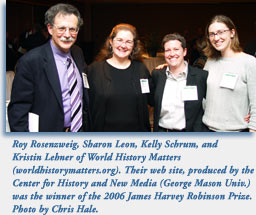 World History Matters (worldhistorymatters.org), web site produced by the Center for History and New Media, George Mason University. Roy Rosenzweig, executive producer; T. Mills Kelly, co-director; Kelly Schrum, co-director; Sharon Leon, associate director; Kristin Lehner, project manager. A project of the Center for History and New Media, World History Matters (including World History Sources and Women in World History) is an exemplary web portal. The impressive depth and breadth of its primary sources, the comprehensive geographical scope and transnational approach, and the user-friendly site design will enable high school and college world history teachers and students to make use of the rich site resources to investigate the complexities of global history.
World History Matters (worldhistorymatters.org), web site produced by the Center for History and New Media, George Mason University. Roy Rosenzweig, executive producer; T. Mills Kelly, co-director; Kelly Schrum, co-director; Sharon Leon, associate director; Kristin Lehner, project manager. A project of the Center for History and New Media, World History Matters (including World History Sources and Women in World History) is an exemplary web portal. The impressive depth and breadth of its primary sources, the comprehensive geographical scope and transnational approach, and the user-friendly site design will enable high school and college world history teachers and students to make use of the rich site resources to investigate the complexities of global history.
Wesley-Logan Prize
Kenneth M. Bilby (Center for Black Music Research, Columbia College Chicago), forTrue-Born Maroons (Univ. Press of Florida, 2005). Kenneth Bilby’s book examines the history of dispersion through maroon narratives that speak of Africa, of slave trade and settlement, of escapes from the plantation into new maroon settlements; it narrates the history of adjustment and resistance through the creation of new communities outside of the world of slavery. The book charts innovative and impressive ground both in recounting maroon history and in addressing the relevance of submerged oral histories for historians and social scientists.
Note: By committee decision, the John E. O’Connor Film Award for 2006 was not granted.

